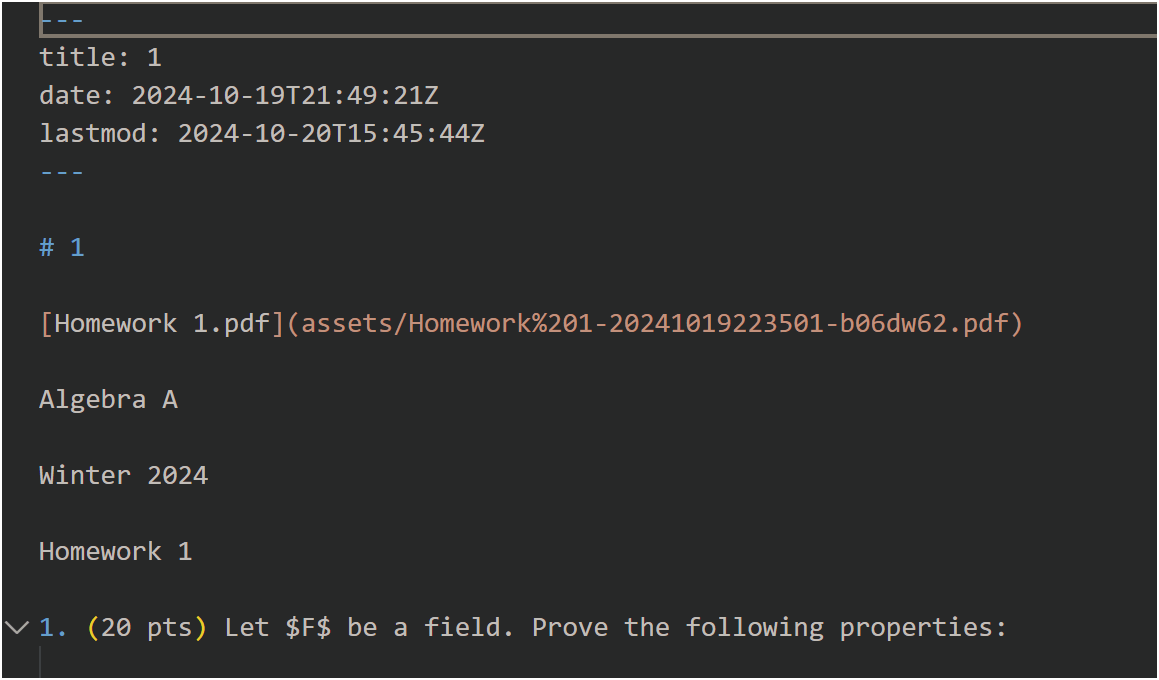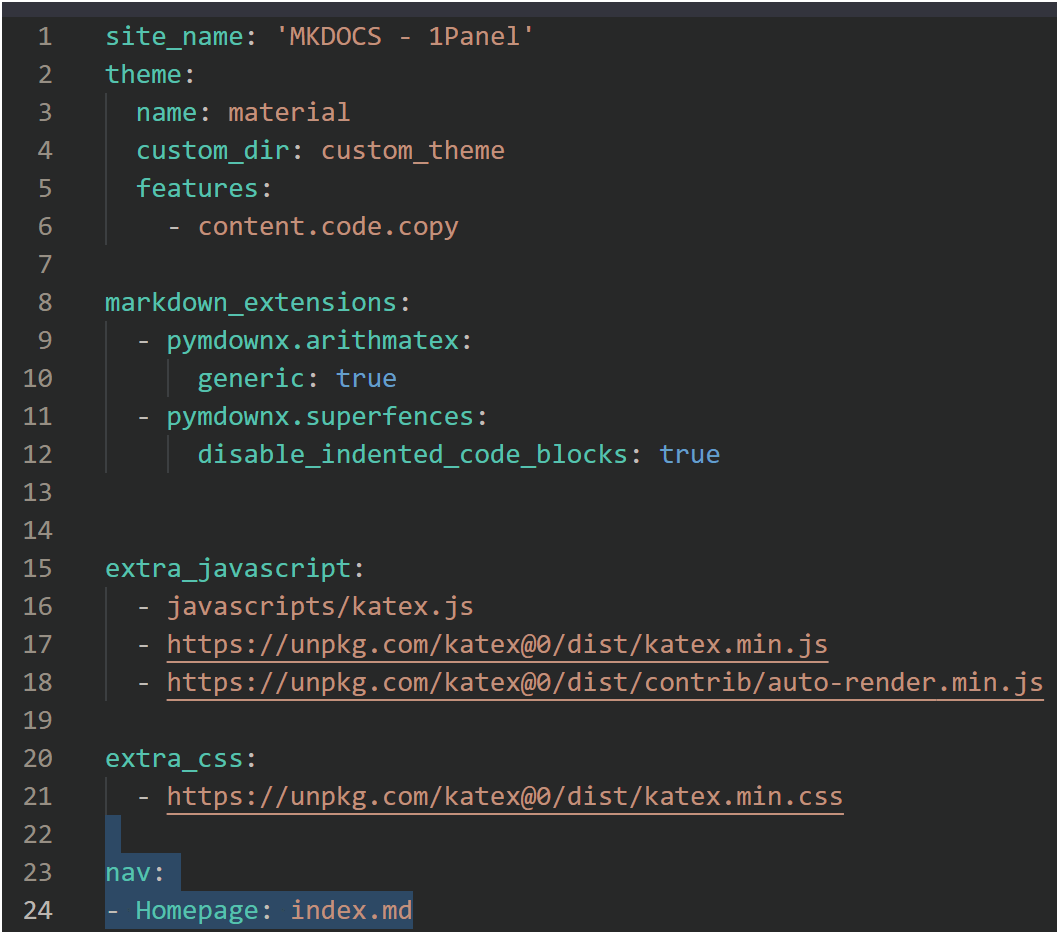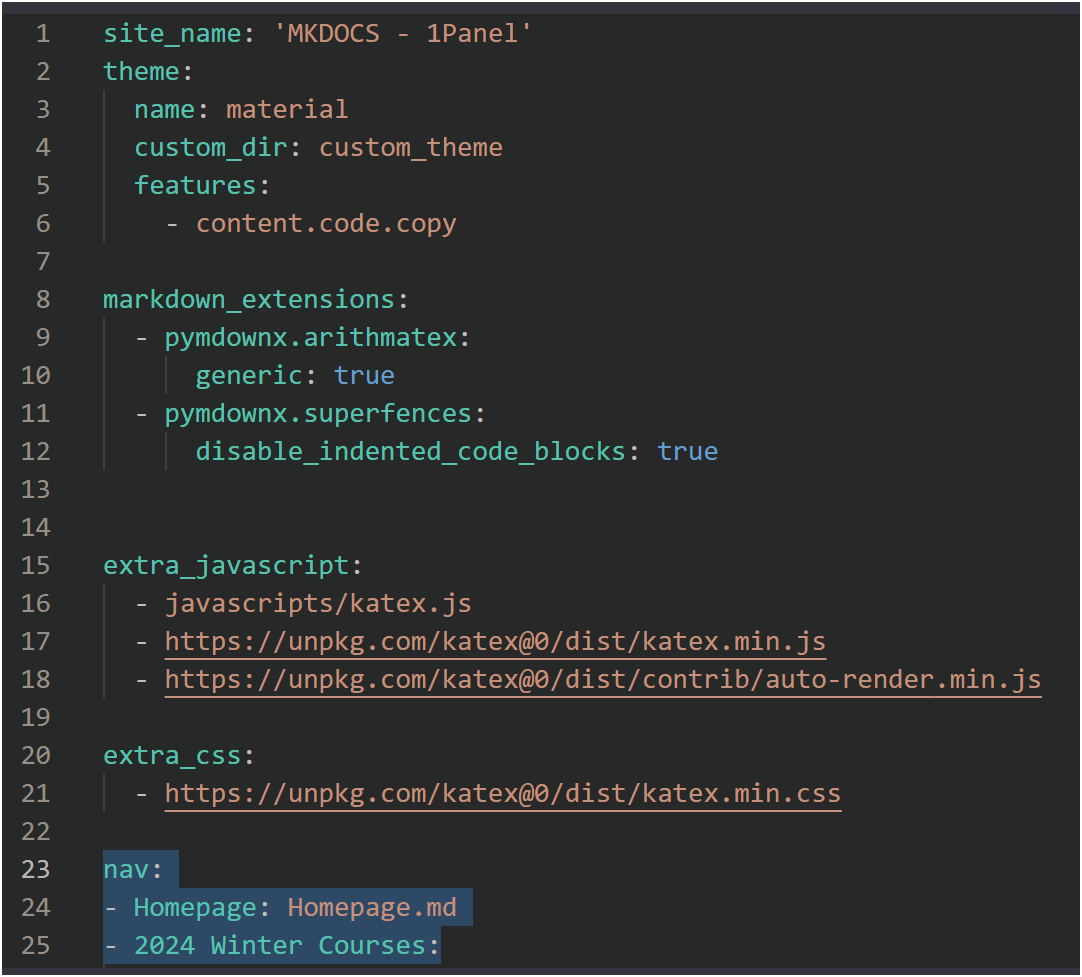Background
I use markdown editor to type maths and cs notes, then i use a plugin to publish the .md file into the directory of ECS. Then i can see my note in mkdocs.
However, there are 3 issues:
-
The maths formula cannot be rendered
-
The file in the file tree is not ordered according to creation time
-
Some lists dont break into new lines (if occurs)
Thus here is the solution
Solution
Maths formula rendering
-
add the following code to
mkdocs.yml
markdown_extensions:
- pymdownx.arithmatex:
generic: true
- pymdownx.superfences:
disable_indented_code_blocks: true
extra_javascript:
- javascripts/katex.js
- https://unpkg.com/katex@0/dist/katex.min.js
- https://unpkg.com/katex@0/dist/contrib/auto-render.min.js
extra_css:
- https://unpkg.com/katex@0/dist/katex.min.css-
cd /docs -
mkdir javascripts -
cd javascripts -
touch katex.js -
Write the following code into that .js file
document$.subscribe(({ body }) => {
renderMathInElement(body, {
delimiters: [
{ left: "$$", right: "$$", display: true },
{ left: "$", right: "$", display: false },
{ left: "\\(", right: "\\)", display: false },
{ left: "\\[", right: "\\]", display: true }
],
})
})-
reboot mkdocs service
File ordering by creation time
I use python to generate a manual navigation tree and add it into mkdocs.yml , then i just need to set up a cron job.
!!!Please ensure the .md file including YAML metadata. You can add this when exporting .md file in your own markdown editor (if have).
Example of YAML metadata in markdown:

-
cd /data -
touch generate_nav.py -
add the following code into it
import os
import glob
import re
import yaml
from datetime import datetime
def extract_date(md_file):
"""
Extract only the line in the markdown file formatted as `date: 2024-10-19T21:49:21Z`
"""
with open(md_file, 'r', encoding='utf-8') as f:
content = f.read()
match = re.search(r'^date:\s*(\S+)', content, re.MULTILINE)
if match:
date_str = match.group(1)
try:
dt = datetime.fromisoformat(date_str.replace("Z", "+00:00"))
return dt
except Exception as e:
print(f"Error parsing date in {md_file}: {e}")
return None
def insert_into_tree(tree, parts, file_info):
"""
Insert file information into the directory tree based on the parts split from the file's relative path
"""
if len(parts) == 1:
tree.setdefault('files', []).append(file_info)
else:
dir_name = parts[0]
tree.setdefault('subdirs', {})
if dir_name not in tree['subdirs']:
tree['subdirs'][dir_name] = {}
insert_into_tree(tree['subdirs'][dir_name], parts[1:], file_info)
def build_tree(docs_path):
"""
Traverse the docs directory and build a directory tree containing file information,
where each file info includes title (using the filename without extension), relative path, and extracted date data
"""
tree = {}
md_files = glob.glob(os.path.join(docs_path, '**/*.md'), recursive=True)
for md_file in md_files:
rel_path = os.path.relpath(md_file, docs_path).replace(os.sep, '/')
dt = extract_date(md_file)
title = os.path.splitext(os.path.basename(md_file))[0]
file_info = {
'title': title,
'path': rel_path,
'date': dt
}
parts = rel_path.split('/')
insert_into_tree(tree, parts, file_info)
return tree
def sort_tree(tree):
"""
Sort the files in each directory level by date in descending order (with empty dates at the end), and recursively process subdirectories
"""
if 'files' in tree:
tree['files'].sort(key=lambda x: x['date'] if x['date'] is not None else datetime.min, reverse=True)
if 'subdirs' in tree:
for sub in tree['subdirs'].values():
sort_tree(sub)
def tree_to_nav(tree):
"""
Convert the directory tree into the mkdocs nav configuration format:
- Files at the current level as {title: file path}
- Subdirectories as {directory name: [subitems, ...]}
"""
nav = []
if 'files' in tree:
for file in tree['files']:
# If the filename is index.md, use Homepage: instead of the filename as the title
if file['title'] == 'index':
nav.append({'Homepage': file['path']})
else:
nav.append({file['title']: file['path']})
if 'subdirs' in tree:
for subdir, subtree in sorted(tree['subdirs'].items()):
sub_nav = tree_to_nav(subtree)
nav.append({subdir: sub_nav})
return nav
def main():
# Set the project directory and switch the working directory to ensure mkdocs.yml can be found
project_dir = os.path.join(os.getcwd()) # Change to the absolute path of your project root, e.g., '/home/user/my_project'
os.chdir(project_dir)
docs_path = os.path.join(project_dir, 'docs')
tree = build_tree(docs_path)
sort_tree(tree)
nav_config = tree_to_nav(tree)
mkdocs_file = os.path.join(project_dir, 'mkdocs.yml')
if not os.path.exists(mkdocs_file):
print("mkdocs.yml file does not exist, please check if the path is correct.")
return
# Read the entire file content
with open(mkdocs_file, 'r', encoding='utf-8') as f:
content = f.read()
# Use regex to find the nav: section and remove it
# Assuming nav: is the last configuration item, delete everything from nav: to the end of the file
new_content = re.sub(r'\nnav:.*', '', content, flags=re.DOTALL).rstrip() + "\n\n"
# Convert the new nav configuration to YAML text
nav_yaml = yaml.dump({'nav': nav_config}, allow_unicode=True, sort_keys=False, default_flow_style=False)
# Concatenate the content and write back to mkdocs.yml
updated_content = new_content + nav_yaml
with open(mkdocs_file, 'w', encoding='utf-8') as f:
f.write(updated_content)
print("mkdocs.yml has been updated, the new nav configuration has overwritten the original nav section.")
if __name__ == '__main__':
main()-
python3 generate_nav.py(Note: it will process all the .md file in your directory and subdirectories and update yml)
Check: If you see nav: at the end of your mkdocs.yml , then it succeeded.
Example:

Issue of breaking into new lines in list
If you don't have this issue, you can omit this.
Some of my source code of .md files is like
1. The first idea, first line
The first idea, second line
2. The second idea, first lineThen mkdocs will render it like
1. The first idea, first line
The first idea, second line2. The second idea, first lineThen problem is that there isn't a new line between The first idea, second line and 2. The second idea, first line
Thus we need to add a new line between them to render it correctly, like this
1. The first idea, first line
The first idea, second line
2. The second idea, first lineThus i also use a python script
-
cd /docs -
create
format_lists.py -
add the following code
import os
import re
import logging
# Configure logging, record to file and console
logging.basicConfig(
level=logging.INFO, # Set log level to INFO, reducing debug information
format='%(asctime)s - %(levelname)s - %(message)s',
handlers=[
logging.FileHandler('format_lists.log'),
logging.StreamHandler()
]
)
def is_top_level_list_item(line):
"""Check if a line is a top-level ordered list item (e.g., '1.', '2.'), with no indentation"""
stripped_line = line.lstrip()
return re.match(r'^\d+\.\s', stripped_line) is not None and not line.startswith((' ', '\t'))
def is_list_item_content(line):
"""Check if a line is content of a list item (indented or empty line)"""
return line.startswith((' ', '\t')) or line.strip() == ''
def process_markdown_file(file_path):
"""Process a single Markdown file, adding an empty line between top-level ordered list items"""
logging.info(f"Starting to process file: {file_path}")
with open(file_path, 'r', encoding='utf-8') as file:
lines = file.readlines()
new_lines = []
in_code_block = False
in_list_item = False # Flag to indicate whether processing list item content
for i, line in enumerate(lines):
stripped = line.strip()
# Skip code blocks
if stripped.startswith('```'):
in_code_block = not in_code_block
new_lines.append(line)
continue
if not in_code_block:
if is_top_level_list_item(line):
# If currently in a list item and about to start a new list item, insert an empty line
if in_list_item:
new_lines.append('\n')
new_lines.append(line)
in_list_item = True
else:
new_lines.append(line)
# If not list item content, end the current list item state
if not is_list_item_content(line):
in_list_item = False
else:
new_lines.append(line)
# Check if the file has changed
if new_lines != lines:
with open(file_path, 'w', encoding='utf-8') as file:
file.writelines(new_lines)
logging.info(f"File {file_path} has been updated")
else:
logging.info(f"File {file_path} has not changed")
def process_directory(directory):
"""Traverse the directory, processing all Markdown files"""
logging.info(f"Starting to process directory: {directory}")
for root, _, files in os.walk(directory):
for file in files:
if file.endswith('.md'):
file_path = os.path.join(root, file)
process_markdown_file(file_path)
logging.info(f"Finished processing directory: {directory}")
if __name__ == "__main__":
directory = '.' # Process the current directory
process_directory(directory)-
python3 format_lists.py
Check: You can see the log output to check whether it succeeds
Here is my directory tree in /opt/1panel/apps/mkdocs-material/mkdocsmaterial/data for your reference
/opt/1panel/apps/mkdocs-material/mkdocsmaterial/data » tree
├── docs
│ │── index.md
│ ├── format_lists.py
│ └── javascripts
│ └── katex.js
├── generate_nav.py
└── mkdocs.ymlCron task
Use a cron task to run it automatically. Set it up by your own. Reference:
cd /opt/1panel/apps/mkdocs-material/mkdocsmaterial/data && /usr/bin/python3 generate_nav.py
cd /opt/1panel/apps/mkdocs-material/mkdocsmaterial/data/docs && /usr/bin/python3 format_lists.py